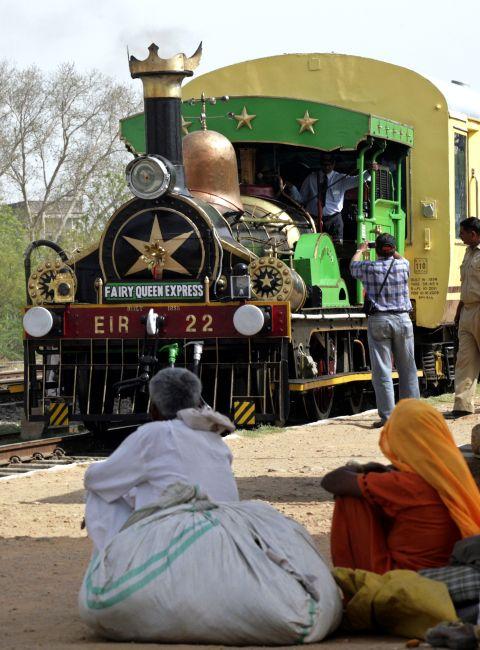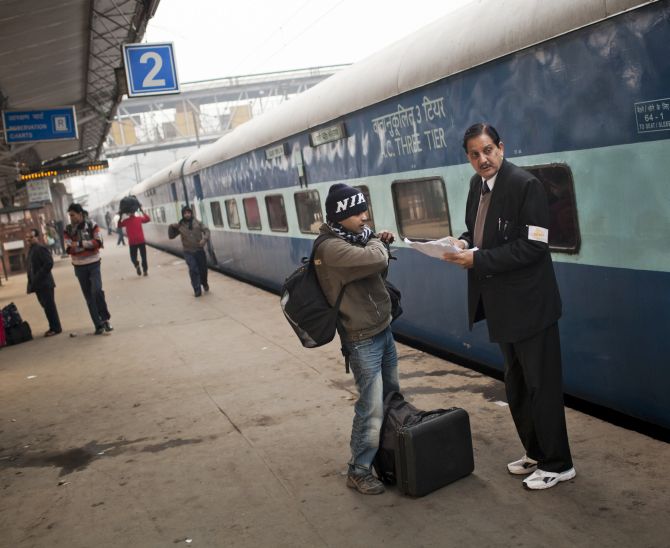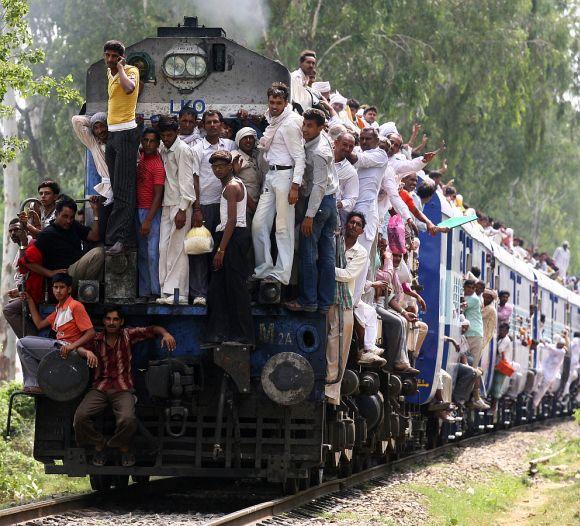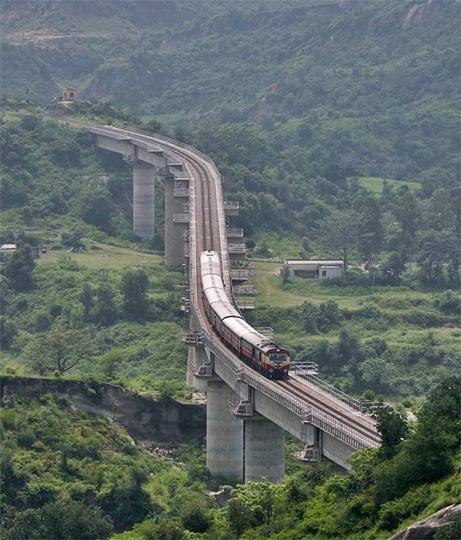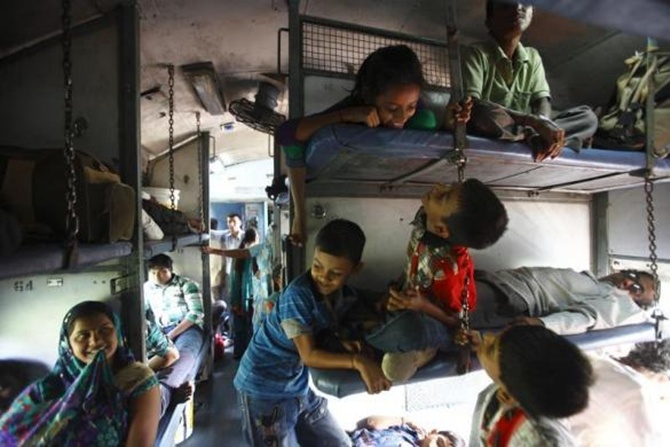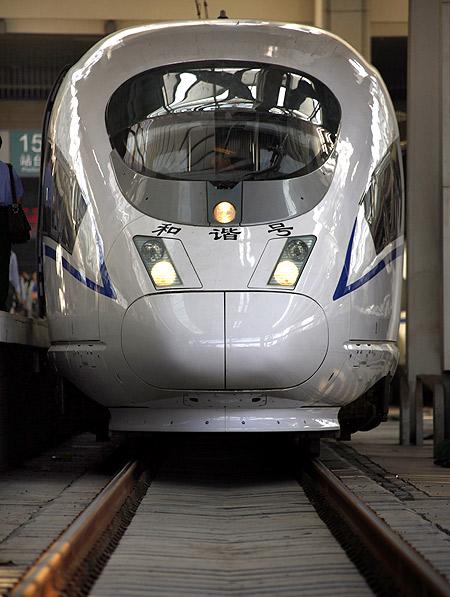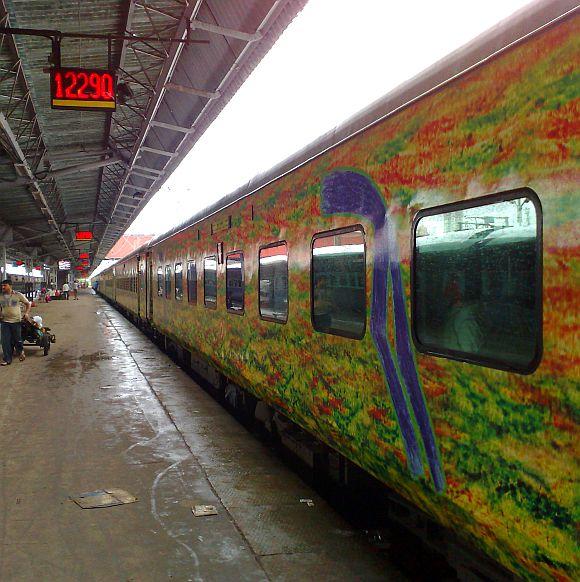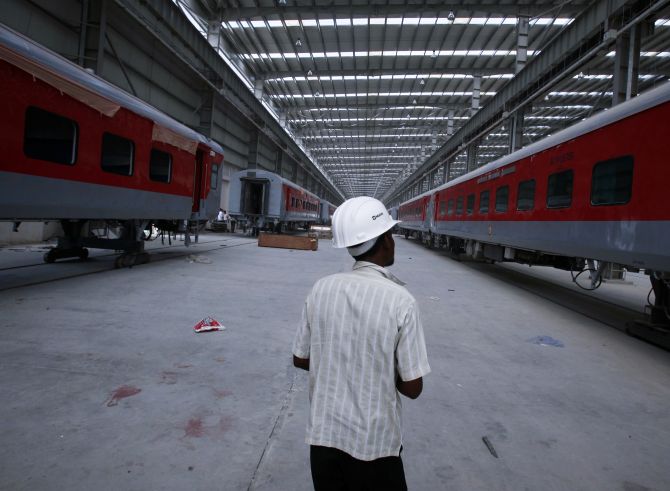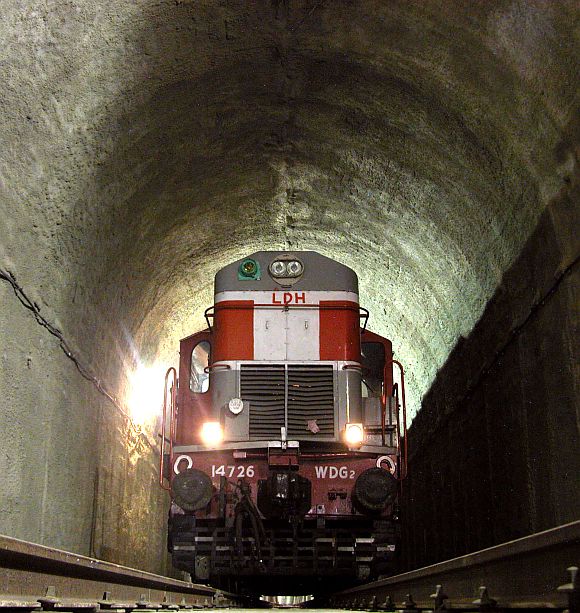 | « Back to article | Print this article |
Is the Modi govt serious about transforming Railways?
While the government's intention is to revamp the country's rail network, a half-hearted attempt at creating a more efficient organisation could derail the whole process.
When political interference, poor asset management, high tariffs, low quality of services and a constant loss of traffic to other modes of conveyance hit the Japanese Railways in 1987, a detailed restructuring plan was drawn up.
Under the plan, the government-controlled rail system was divided into seven different companies. By turn, these companies went public. Services improved, competition brought down tariffs and efficiency rose.
Similar factors triggered reform processes in other railways across the world, including in New Zealand, the United States, Canada, Britain and Argentina.
The Indian Railways faces problems similar to the ones that plagued these railways. But for years, it has failed to respond to the challenge of chalking out reforms.
Please click NEXT to read more…
Is the Modi govt serious about transforming Railways?
The Railways currently works on a century-old, top-down hierarchical model in which a six-member Railway Board headed by a chairman creates, implements and monitors the rail policy and takes all key decisions.
It is separated into 16 geographical zones that employ over 1.4 million people in a monopolistic operation.
Given this, the recent Railway Budget made a brief, yet key, announcement on restructuring the Railway Board by separating policy making from executive powers. Other steps include modernisation of station and a deeper engagement with the private sector.
Please click NEXT to read more...
Is the Modi govt serious about transforming Railways?
Delegating powers
“After the Budget, we are undertaking a process through which more powers will be delegated to the zonal railways,” says a senior Railway Board official who did not want to be named.
“The power to approve projects and to allocate budgets could also be delegated to additional members in the Railway Board or to executive directors. The routine work of monitoring punctuality, timetables and other issues will not be taken up by the Railway Board.”
Are things finally changing? Before being too enthusiastic about change being ushered in the Railways, it would be instructive to see how successful examples of apex-level structuring in international rail systems prove that the process cannot be undertaken without a long-term plan of at least 6 to 12 years.
Please click NEXT to read more…
Is the Modi govt serious about transforming Railways?
Other crucial initiatives include a switch to e-governance and bigger reliance on technology for auditing and project monitoring. Monitoring execution of projects and other decisions will be assigned to the lower bureaucracy so that the Railway Board can focus on its policy-making function.
However, the measures seem incapable of meeting the serious problems confronting the Railways, feel analysts. Moreover, there does not appear to be a long-term objective behind the changes.
No wonder, then, senior Railway officials confirm that there is neither a proposal at the moment to set up a high-level committee to steer the restructuring of the Railway Board, nor is a consolidated plan to set up such a committee under way.
Please click NEXT to read more...
Is the Modi govt serious about transforming Railways?
The current plan expects the Railway Board to “restructure itself”, say experts, who also are pessimistic about any real change being effected.
“An empowered committee needs to take up the case of the Railway Board, the process cannot happen internally,” says Akhileshwar Sahay, a former Railway official and sector expert.
Adds J P Batra, former chairman, Railway Board: “Similar initiatives were taken during the tenure of Lalu Prasad Yadav as railway minister. Though such moves bring short-term efficiency, they are dependent on and driven by the personality of the minister. With no formal mechanisms set up with a long-term approach, any fundamental change is unlikely to follow.”
Please click NEXT to read more...
Is the Modi govt serious about transforming Railways?
Strong lobbies, political influence and powerful labour unions have a vice-like grip on the Indian Railways that requires realistic structural changes to loosen it.
“Today, the concern is more about which department will be asked to bear the responsibility whenever there is an accident,” rues a senior Railways official on condition of anonymity.
“There is no focus as an organisation, everything is driven by departmental loyalties. No one wants to experiment with a new idea for fear that the responsibility for any failure will be attributed to that department.”
The mechanical department currently dominates the decision-making in the Railways, and exerts a big influence over budget allocations.
These problems were faced by the railways of other countries too.
Please click NEXT to read more...
Is the Modi govt serious about transforming Railways?
In Japan, the civil engineering group was a powerful cadre with a firm hold on major budget allocations for years before the reform process started in 1987, according to a study by the United States’ National Bureau of Economic Research.
The Chinese railways too suffered inefficiency due to corruption before the country’s ministry of railways was scrapped to set up a state-owned Chinese Railways Corporation.
Falling share of railways in the overall passenger traffic and increasing competition from other modes of transportation led to Swedish rail reforms. The need to curb deficit spending underlined the speedy process of reform of Argentina’s rail system.
Please click NEXT to read more...
Is the Modi govt serious about transforming Railways?
Private partnership problem
As for a partnership with the private sector, the Indian Railways has no coherent policy governing tariffs, project implementation or resource allocation.
The latest Comptroller and Auditor General report bemoans the fact that the Railways has toyed with the idea of public-private partnerships without having a model concessionaire agreement for more than a decade now.
The railways’ market share in freight and passenger segment has fallen to 33 per cent and 12 per cent respectively from 90 per cent and 65 per cent in 1950.
The Japanese Railways successfully experimented with privatisation, though it has to be admitted that Britain’s attempt to go private was a failure.
The United States and Canada took a bottom-up restructuring, which a discussion paper by Frankfurt-based Centre of Financial Studies allowed the private sector a share in low-density lines and to buy or sell track rights.
Please click NEXT to read more...
Is the Modi govt serious about transforming Railways?
Of course, the Railways does not lack ideas. The Sam Pitroda Committee Report of 2012 calls for reorganisation of the Railway Board with separate board members for passenger, freight, technology and business development.
The report calls for scrapping the position of chairman of the Railway Board and replacing it with a chief executive officer instead.
This is in stark contrast to the current organisation based on cadre-like mechanical, engineering and electrical departments with no separation of passenger and freight businesses.
Other key suggestions of the panel included the appointment of an ombudsman for all private-public partnership projects who would hold a quasi-judicial authority to resolve all disputes regarding contracts.
Please click NEXT to read more...
Is the Modi govt serious about transforming Railways?
The Anil Kakodkar Committee report on rail safety as well as the railway ministry’s 2009 White Paper on Indian Railways have also called for similar reforms.
But with the Railway Board resisting the surrender of all its powers, any attempt at reform has only been half-hearted.
For instance, a new Rail Tariff Authority will be set up, but it will be devoid of any regulatory power, despite the Planning Commission’s insistence that it be given more teeth.
With an ambiguous reforms road map, it seems that the promise of acche din might elude the national transporter in the coming years. The only way to prevent this is to make urgent changes right away.
